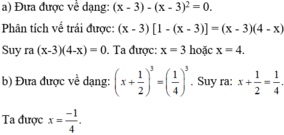Tìm X biết : X: 2/3 +X x3/2 + X = 2
Hãy nhập câu hỏi của bạn vào đây, nếu là tài khoản VIP, bạn sẽ được ưu tiên trả lời.


a: \(\Leftrightarrow x\left(x-5\right)\left(x+5\right)=0\)
\(\Leftrightarrow\left[{}\begin{matrix}x=0\\x=5\\x=-5\end{matrix}\right.\)

a,x(2x-1)-(x-1)^2-x^2=0
<=>x(2x-1-x)-(x-1)^2=0
<=>x(x-1)-(x-1)^2=0
<=>(x-x+1)(x-1)=0
<=>x-1=0
<=>x=1
b,(x+2)^3-x^3-6x^2=4
<=>x^3+6x^2+12x+8-x^3-6x^2=4
<=>12x+8=4
<=>x=-1/3
tick mik nha
`a)x(2x-1)-(x-1)^2-x^2=0`
`<=>2x^2-x-x^2+2x-1-x^2=0`
`<=>x-1=0`
`<=>x=1`
Vậy `x=1.`
`b)(x+2)^3-x^3-6x^2=4`
`<=>x^3+6x^2+12x+8-x^3-6x^2=4`
`<=>12x+8=4`
`<=>12x=-4`
`<=>x=-1/3`
Vậy `x=-1/3.`

a) \(\left(x-1\right)^3\)
\(=x^3-3x^2+3x-1\)
b) \(\left(2x-3y\right)^3\)
\(=\left(2x\right)^3-3\left(2x\right)^23y+3.2x\left(3y\right)^3+\left(3y\right)^3\)
\(=8x^3-36x^2y+54xy^2-27y^3\)
Bài 3:
a: Ta có: \(\left(x-2\right)^3-x^2\left(x-6\right)=5\)
\(\Leftrightarrow x^3-6x^2+12x-8-x^3+6x^2=5\)
\(\Leftrightarrow12x=13\)
hay \(x=\dfrac{13}{12}\)
b: Ta có: \(\left(x-1\right)\left(x^2+x+1\right)-x\left(x+2\right)\left(x-2\right)=4\)
\(\Leftrightarrow x^3-1-x^3+4x=4\)
\(\Leftrightarrow4x=5\)
hay \(x=\dfrac{5}{4}\)

\(a,\Leftrightarrow\left(x+3\right)\left(x+3-2x-1\right)=0\\ \Leftrightarrow\left(x+3\right)\left(2-x\right)=0\Leftrightarrow\left[{}\begin{matrix}x=-3\\x=2\end{matrix}\right.\\ b,\Leftrightarrow x\left(x^2-12x+36\right)=0\\ \Leftrightarrow x\left(x-6\right)^2=0\Leftrightarrow\left[{}\begin{matrix}x=0\\x=6\end{matrix}\right.\)
a, (x+3)2 - ( 2x + 1 ).( x+3)=0 b, x3-12x2+36x =0
=> (x+3).(x+3-2x-1) => x(x2-12x+36) = 0
=>(x+3).(-x+2) => x(x-6)2 = 0
=> x+3=0 <=> x=-3 => x=0 <=> x=0
-x+2=0 <=> x=-2 x-6= 0 <=> x=6

a) x = 1; x = - 1 3 b) x = 2.
c) x = 3; x = -2. d) x = -3; x = 0; x = 2.

\(a,PT\Leftrightarrow x^3-6x^2+12x-8-x^3+x+6x^2-18x-10=0\)
\(\Leftrightarrow-5x-18=0\)
\(\Leftrightarrow x=-\dfrac{18}{5}\)
Vậy ...
\(b,PT\Leftrightarrow x^3+3x^2+3x+1-x^3+3x^2-3x+1-6x^2+12x-6+10=0\)
\(\Leftrightarrow12x+6=0\)
\(\Leftrightarrow x=-\dfrac{1}{2}\)
Vậy ...
\(c,PT\Leftrightarrow\left(x+1\right)^3+3^3=0\)
\(\Leftrightarrow\left(x+1+3\right)\left(x^2+2x+1-3x-3+9\right)=0\)
\(\Leftrightarrow\left(x+4\right)\left(x^2-x+7\right)=0\)
Thấy : \(x^2-\dfrac{2.x.1}{2}+\dfrac{1}{4}+\dfrac{27}{4}=\left(x-\dfrac{1}{2}\right)^2+\dfrac{27}{4}\ge\dfrac{27}{4}>0\)
\(\Rightarrow x+4=0\)
\(\Leftrightarrow x=-4\)
Vậy ...
\(d,PT\Leftrightarrow\left(x-2\right)^3+1^3=0\)
\(\Leftrightarrow\left(x-2+1\right)\left(x^2-4x+4-x+2+1\right)=0\)
\(\Leftrightarrow\left(x-1\right)\left(x^2-5x+7\right)=0\)
Thấy : \(x^2-5x+7=x^2-\dfrac{5.x.2}{2}+\dfrac{25}{4}+\dfrac{3}{4}=\left(x-\dfrac{5}{2}\right)^2+\dfrac{3}{4}\ge\dfrac{3}{4}>0\)
\(\Rightarrow x-1=0\)
\(\Leftrightarrow x=1\)
Vậy ...


Ta có :
\(x\div\frac{2}{3}+x\times\frac{3}{2}+x=2\)
\(x\times\frac{3}{2}+x\times\frac{3}{2}+x=2\)
\(x\times(\frac{3}{2}+\frac{3}{2}+1)=2\)
\(x\times4=2\)
\(x=2\div4\)
\(x=\frac{1}{2}\)
Vậy x = \(\frac{1}{2}\)
\(x\div\frac{2}{3}+x\times\frac{3}{2}+x=2\)
\(x\times\frac{3}{2}+x\times\frac{3}{2}+x=2\)
\(x\times\left(\frac{3}{2}+\frac{3}{2}+1\right)=2\)
\(x\times4=2\)
\(x=\frac{1}{2}\)